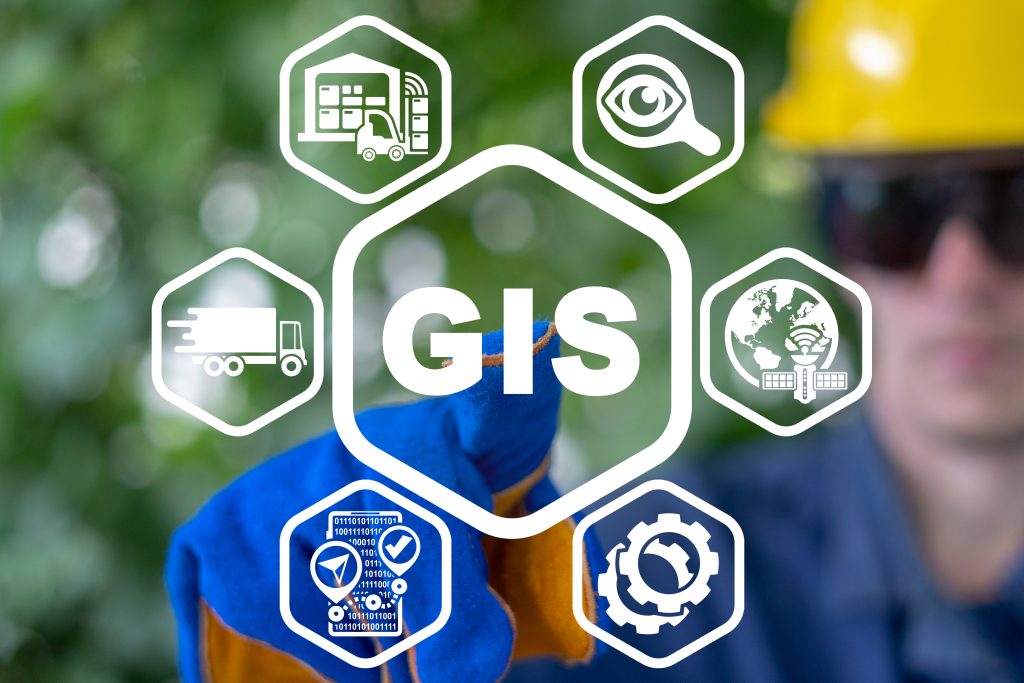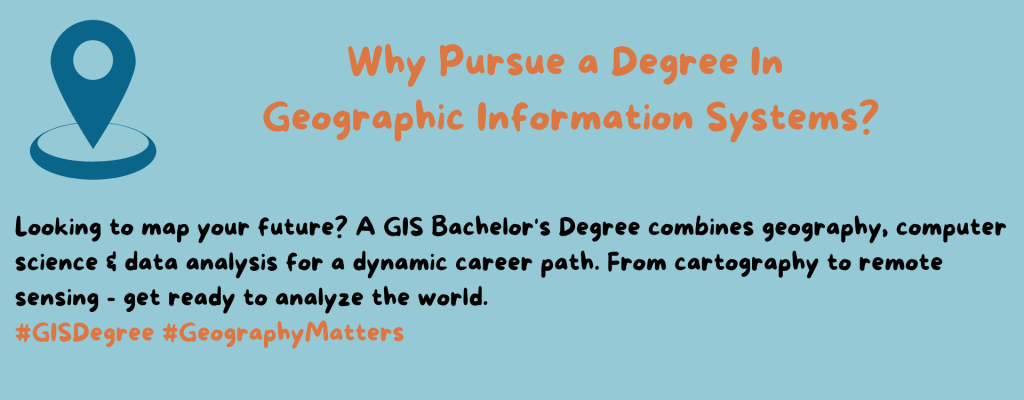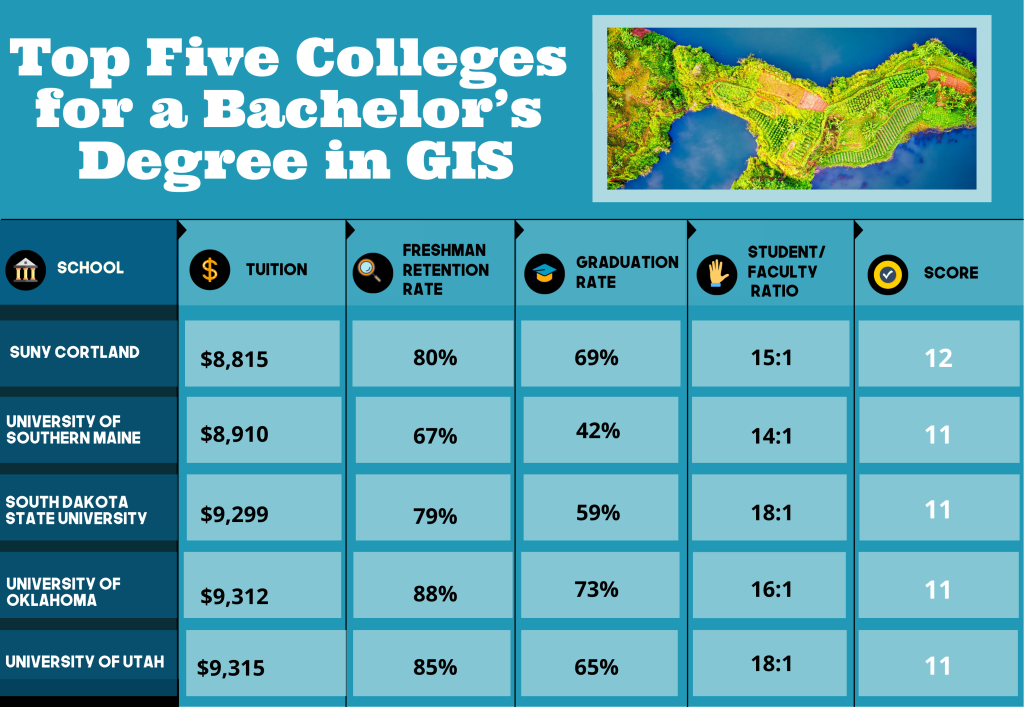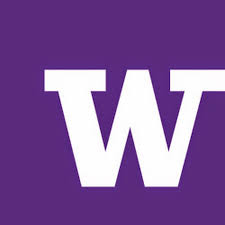
The 15 Best Programs for a Bachelors in Geographic Information Systems was first ranked in 2020 and last updated in 2024.
Welcome to our in-depth exploration of the top 15 bachelor’s degree programs in Geographic Information Science (GIS). GIS is a rapidly evolving field that harnesses the power of data to help us understand and navigate our world. It’s an area that has grown increasingly significant, with applications ranging from urban planning and environmental conservation to public health and business logistics. With such diverse potential uses, it’s no surprise many are keen on gaining expertise in this discipline., and there are a range of careers in GIS to choose from.
Featured Programs

Our list represents a wide range of institutions offering exceptional GIS education for undergraduates. Why dive into this world of spatial information? Why invest years studying GIS? The answer is simple: opportunity. A GIS degree is more than just science. It’s about connecting the dots between environmental sciences, physical science, social science, real estate trends, government policy, and so much more.

Why Pursue a Degree in Geographic Information Science?
The digital age has led to the collection and digitization of vast amounts of spatial data. GPS technology, remote sensing, satellites, and internet-connected devices continuously generate geospatial information. This abundance of data has created a strong demand for people who can manage, analyze, and visualize it effectively.
GIS is an expanding field experiencing explosive growth. Many fields rely heavily on geospatial data and technology, including urban planning, environmental management, transportation, public health, and more. But the industry needs skilled professionals who understand its language—professionals like you could be!
As we delve into each program, you’ll discover more about what makes these schools stand out in this fascinating field. But first, let’s take a quick look at our top five schools for a bachelor’s in GSI.

1. SUNY Cortland

Cortland, New York
Nestled in the picturesque Finger Lakes region of upstate New York, SUNY Cortland has roots dating back to its founding in 1868. This distinguished institution has become a dynamic center for learning and personal growth. The school enrolls about 6,600 students and is dedicated to academic excellence, scholarship, and community engagement, which makes it an educational powerhouse.
The Geography Department at SUNY Cortland offers a Bachelor of Science in Geographic Information Science. In this program, you’ll learn how to develop cutting-edge solutions to real-world problems using business skills and technology. This affordable GIS program features four concentrations:
- Advanced Geospatial Applications
- Computer Techniques
- Demographics and Business Geographics
- Environmental Science
This program’s unique feature is its focus on practical training. You will have the opportunity to use the Environmental Systems Research Institute (ESRI) authorized learning center with 25 GIS workstations. Additionally, you will learn how to conduct field surveys using GPS base stations and handheld units in the lab.
You’ll also get to participate in student-faculty research opportunities and study-abroad options. Plus, you can intern at organizations working with geospatial technologies. While studying here, you will not only gain academic knowledge but also experience living life as a GIS professional.
In-State Tuition: $8,815
Out-of-State Tuition: $18,725
Accreditation: Middle States Commission on Higher Education

2. South Dakota State University

Brookings, South Dakota
South Dakota State University is situated in the vibrant college town of Brookings, renowned as one of the top college towns in the nation. The university attracts approximately 11,000 students and offers an extensive array of clubs, resources, and amenities, providing a rich and diverse collegiate experience.
The BS in Geographic Information Sciences at SDSU blends technical skills with hands-on applications. Students choose from two focus areas: GIS Analyst or GIS Developer. The analyst option focuses on vector and raster modeling, GIS applications, and data creation and integration. The developer option features courses in spatial databases, Web GIS, and programming for geospatial data analysis.
Courses cover everything from sustainability to satellite remote sensing. Students can also select from electives such as hydrology, cartography, surveying, and more. The 120-credit program is a blend of fieldwork, lab research, lectures, discussions, and some online coursework. Plus, undergraduate GIS students have excellent internship opportunities at facilities like the nearby USGS EROS Center.
In-State Tuition: $9,299
Out-of-State Tuition: $12,809
Accreditation: Higher Learning Commission
3. University of Southern Maine

Portland and Gorham, Maine
The University of Southern Maine is split between two campus locations. One is in Portland, a picturesque coastal city known for its historic architecture, vibrant arts community, and thriving culinary scene. The other is 11 miles away in Gorham, a small town characterized by quaint shops and eateries, a friendly community, and a tranquil atmosphere. Together, these two campuses enroll just over 7,500 students a year.
USM offers a BA in Geography-Anthropology with a specialization in Applied Geographic Information Systems (GIS) and Geospatial Analysis. This track is for those who want to gain technical and analytical skills in GIS, geospatial analysis, and remote sensing through hands-on experience.
Field education is the backbone of this program. So, you will engage in intensive lab and field research through fellowships and assistantships. These are supported through organizations like NASA, the National Science Foundation, and the Maine Space Grant Consortium.
Students benefit from three GIS laboratories that provide high-tech, hands-on learning environments. These serve as both research and teaching facilities, allowing for student-faculty collaborations. The labs feature a range of GIS, GPS, and remote sensing software. You’ll also find large format scanners and color printers, high-precision survey gear, and a variety of data resources.
In-State Tuition: $8,910
Out-of-State Tuition: $26,250
Accreditation: New England Commission of Higher Education
4. University of Oklahoma

Norman, Oklahoma
The University of Oklahoma is a major public research university in the heart of America’s Great Plains. Established in 1890, this iconic university is a dynamic center for education, research, and community engagement. The school is steeped in tradition and excellence, and students can participate in outstanding athletics, campus events, and over 400 organizations on a gorgeous, walkable campus.
AT OU, you can pursue a BA or a BS in Geographic Information Science, depending on your interests. The BS provides a more specialized, scientific approach to GIS, while the BA offers a broader, interdisciplinary overview of the field. Both programs feature courses such as:
- The Language of Maps
- Introduction to Spatial Thinking and Computer Mapping
- Fundamentals of Geographic Information Systems
- GIS Applications
- Fundamentals of Remote Sensing
- Digital Image Processing
- Research Methods and Professional Development
GIS students at the University of Oklahoma benefit from several labs for remote sensing, GIS, physical geography, and cartography. Available software includes ARCMap, ENVI, ERDAS, SPSS for statistical analysis, and Microsoft Office products.
In-State Tuition: $9,312
Out-of-State Tuition: $25,880
Accreditation: Higher Learning Commission
5. University of Utah

Salt Lake City, Utah
The University of Utah is a prominent public research university in Salt Lake City. Established in 1850, it is the flagship institution of the Utah System of Higher Education and one of the oldest universities in the American West. It has been ranked among the top ten public universities in the nation by the Wall Street Journal.
The BS degree in Geographic Information Science at UofU provides the foundation for a career in the emerging field of GIS. This program will provide you with the fundamental knowledge of major geographic concepts. But it also covers geospatial modeling and statistics, geographic data and information, and more. Students will gain a strong understanding of GIS theory and methodology so they can design and execute research in the field.
All undergraduate GIS students will complete a research project, internship, or both. This will allow them to pursue a specific area of interest while gaining hands-on experience in the field. They will also have the opportunity to earn a Geographic Information Science Certificate.
In-State Tuition: $9,315
Out-of-State Tuition: $29,837
Accreditation: Northwest Commission on Colleges and Universities

6. Mississippi State University

Starkville, Mississippi
Mississippi State University is a public land-grant university with a rich heritage. This esteemed college has played a pivotal role in shaping higher education in the American South. With a diverse and inclusive community of 22,000 students and a legacy of distinguished faculty, MSU stands out for its academic excellence. Notably, it is one of only 2.7% of colleges in the nation to hold the Carnegie Foundation R1-Very High Research Activity designation, solidifying its position as a hub of creativity and opportunity.
The school’s Bachelor of Science in Geographic Information Systems is a multidisciplinary program with a robust curriculum. You’ll find yourself navigating through courses that delve into cartography, GIS, remote sensing, and global positioning systems. You will also learn relational database/geodatabase design and object-oriented programming.
The geospatial program at Mississippi State University is situated within the Department of Geosciences and is nationally acclaimed for hosting the USGS/NGA Geospatial Center of Academic Excellence. The University’s Department of Geosciences features an advanced RS and GIS laboratory with 30 workstations equipped with leading RS, GIS, and statistical software packages.
In-State Tuition: $9,398
Out-of-State Tuition: $25,444
Accreditation: Southern Association of Colleges and Schools, Commission on Colleges
7. University of Buffalo

Buffalo, New York
The University of Buffalo is the SUNY system’s flagship school, with a history spanning over 175 years. UB enrolls more than 32,000 students from over 100 countries across 13 schools and colleges. And with more than 700 study-abroad options across seven continents, UB’s impact resonates far beyond its campus borders.
The Department of Geography offers a BA in Geography with a concentration in Geographic Information Systems. Students pursuing this degree will take foundational classes in geography, cartography, computer science, and math. From there, they can choose electives that align with their academic goals and interests. Some of the electives include:
- Global Economic Geographies
- Maps: Earth From Above
- GIS and Machine Learning
- GIS Data Science Project Management
- Locational Analysis
- GIS Design
- Remote Sensing
Beginning in their first year at UB, all students can participate in hands-on learning, services, and research. With a student-faculty ratio of 12:1, undergraduates can be assured of the opportunity to collaborate with their instructors on projects and initiatives.
In-State Tuition: $10,782
Out-of-State Tuition: $28,702
Accreditation: Middle States Commission on Higher Education

8. University of Maryland

College Park Maryland
The University of Maryland stands as a beacon of academic distinction and innovation. The school has a reputation for scholarly excellence and has continuously pushed the boundaries of education and research. Boasting a diverse community, UMD is renowned for its world-class faculty, groundbreaking discoveries, and a wealth of opportunities.
Those pursuing a GIS bachelor’s degree have several options at UMD. The school offers a Bachelor of Science in Geographical Sciences focusing on human-environmental interactions. However, students will also gain skills in spatial analytics and geographic information science techniques. The BS in Geographical Sciences has two optional specializations: Computational Earth Observation Science and Geospatial Data Science.
The Computational Earth Observation Science specialization allows you to study Earth-observing satellite missions. These missions involve a diverse range of satellites that collect various types of information, which is then analyzed to provide valuable insights. In this program, you’ll gain a solid understanding of the methods used to extract information from satellite images.
In the Geospatial Data Science specialization, you will acquire the technical expertise to handle and analyze large volumes of geographic data effectively. You’ll have comprehensive training in GIS software. And you’ll learn spatial analysis, cartographic vector data, and digital processing of remote sensing observations.
The faculty at SDSU are experienced professionals with deep ties in the industry. They don’t just teach. They also mentor their students through every step of their journey. As a result, you’ll gain insights into current trends within the field directly from those at the forefront of GIS research.
In-State Tuition: $11,233
Out-of-State Tuition: $39,469
Accreditation: Middle States Commission on Higher Education
9. Ohio State University

Columbus, Ohio
Ohio State University is in Columbus, the fastest-growing metro area in the Midwest. It is one of the largest universities in the nation, with over 60,000 students enrolled. OSU offers diverse academic programs, cutting-edge research opportunities, and a bustling campus life. Prospective GIS undergrads will be pleased to note that the school is a designated Center of Academic Excellence in Geospatial Sciences.
At Ohio State University, students can explore the world of GIS through two robust programs: a Bachelor of Science in Geographic Information Science and a Bachelor of Science in Geography with a Specialization in Spatial Analysis.
Bachelor of Science in Geographic Information Science
In this program, you’ll develop expertise in various technologies by taking classes in GIS algorithms and programming, geovisualization, cartography, and more. You’ll learn to use advanced software tools for creating interactive maps that tell powerful stories about our environment.
Bachelor of Science in Geography With a Specialization in Spatial Analysis
This specialized degree lets you combine your passion for geography with practical skills. It’s not just about recognizing locations on the map. It’s learning how those places interact and change over time. This program will teach you the methods, software, and tools to manage and analyze geographic information.
Students pursuing either of these degrees will have access to OSU’s Geography Instructional Labs. Each is equipped with state-of-the-art workstations and the most advanced GIS software needed to finish assignments. Participants can also enhance their educational experience by completing an independent internship or research project with permission from their advisor.
In-State Tuition: $12,485
Out-of-State Tuition: $36,722
Accreditation: Higher Learning Commission
10. University of Minnesota Duluth

Duluth, Minnesota
The University of Minnesota Duluth beckons students to embark on a transformative educational journey on one of the prettiest campuses in the US. Founded in 1947, UMD offers a rich tapestry of programs and opportunities to a diverse and engaged student body of around 9,600.
UMD offers a unique BS program in Geographic Information Science, the sole undergraduate GIS program in the state. Students can access a well-equipped GIS lab, enjoy small class sizes, and receive personalized attention from dedicated faculty. In this program, they will gain the theoretical and practical expertise essential for launching a successful career as a GIS professional. Some of the courses include:
- GIS Data Capture & Management
- GIS Programming
- Geoprocessing with Python
- Geospatial Analysis with Software-as-a-Service
- Digital Image Processing and Analysis
Students are required to complete an internship, and numerous companies actively recruit UMD students as potential employees. Internship opportunities encompass a range of organizations, including NorthPoint Geographic, The City of Duluth, the Arrowhead Regional Development Commission, the MN Department of Natural Resources, and others.
In-State Tuition: $14,126
Out-of-State Tuition: $19,516
Accreditation: Higher Learning Commission

11. University of California-Santa Barbara

Santa Barbara, California
The University of California-Santa Barbara is a public research university with a history dating back to 1891. With its stunning seaside location, dynamic academic community, and commitment to pioneering research and innovation, the school has earned its place as a world-renowned institution. UCSB attracts over 26,420 students each year from all corners of the globe.
UCSB Geography is internationally recognized as one of the best geography departments in the world. For undergraduates, it features an interdisciplinary BA in Geography for those who want broad exposure to all areas of study within the discipline. However, it also offers a Bachelor of Arts in Geography with an emphasis in GIS. The degree requires extensive coursework across one of three concentrations, including:
- Air Photos and Remote Sensing
- Geographic Information Systems and Cartography
- Quantitative Techniques and Theoretical Methods
In this program, you will choose one GIScience track or combine them to add depth to your education. Additionally, you can customize the degree to pursue interests in particular applications or technologies. Upon completion, you’ll be ready to begin a career or pursue a graduate degree in GIS.
In-State Tuition: $14,617
Out-of-State Tuition: $44,171
Accreditation: WASC Senior College and University Commission
12. University of Oregon

Eugene, Oregon
The University of Oregon is a four-year public research university that opened in 1876. Its sprawling campus, adorned with a diverse array of trees and set amidst the picturesque Willamette Valley, provides an inspiring backdrop for students pursuing knowledge, creativity, and adventure.
The university offers two undergraduate programs for those looking to break into the world of GIS. Students can pursue a degree in Geography with a Concentration in Geographic Information Science or one in Spatial Data Science & Technology. Furthermore, each program can be pursued as either a BA or BS.
Both programs emphasize hands-on experiences beyond concepts you learn in the classroom. And there are plenty of opportunities to do this. For example, you may hike in the forest with faculty members to mark GPS points or meet with the Geography Club for a humanitarian mapping project. Study abroad experiences, internships, and research opportunities abound. UO also helps connect students with volunteer work to help them put theory into practice.
As a geography student, you’ll have access to nine labs where you can conduct research and collaborate with faculty and peers on grants, fieldwork, and publications. Undergraduates can also participate in the University of Oregon Undergraduate Research Symposium and share their work with the greater UO community.
In-State Tuition: $15,054
Out-of-State Tuition: $41,700
Accreditation: Northwest Commission on Colleges and Universities
13. Saint Louis University

St. Louis, Missouri
Saint Louis University is one of the nation’s oldest and most prestigious Catholic Universities in the US. The school has a rich history and a commitment to academic excellence. It also offers a diverse array of programs, a warm and caring campus community, and an impressive student-to-faculty ratio of 9:1.
SLU offers a specialized degree in geoinformatics and geospatial analytics. But what makes this program unique? Let’s start with the professors. Saint Louis University’s Department of Earth and Atmospheric Sciences boasts a 100% doctoral faculty who actively contribute to their fields. These instructors bring real-world insights into the classroom.
The program focuses on modern global issues like society, the economy, and the environment. And the coursework combines rigorous theory with hands-on application. Students gain skills in advanced technology and software tools like GeoDA, ArcGIS, ENVI+IDL, Google Earth Engine, Python, SARscape, and more. This ensures graduates are job-ready from day one. Furthermore, SLU encourages students to participate in research projects and fieldwork, providing valuable exposure and experience.
In-State Tuition: $50,644
Out-of-State Tuition: $50,644
Accreditation: Higher Learning Commission

14. Kennesaw State University

Kennesaw, Georgia
Kennesaw State University is part of the University System of Georgia and the third-largest university in the state. The school comprises two metro Atlanta campuses with an enrollment of over 43,000. It’s also a Carnegie-designated doctoral research institution (R2) that draws a diverse range of students from all over the world.
Kenneseaw’s unique Bachelor of Science in Geospatial Science is a 120-credit program offered on-campus or online. Students who need a flexible schedule can also choose a blended format. The degree integrates applied research with various geospatial technologies, including remote sensing, Geographic Information System (GIS), and land surveying.
Students in this program will learn fundamental geospatial skills and content from one of three concentrations. These include Information Systems, Human-Environment Systems, and Land Surveying. And they can further customize the program by choosing from a vast array of electives.
The top-notch Geography and Anthropology faculty coordinates research labs and cultivates collaborative, experiential opportunities. You’ll gain plenty of hands-on experience and the chance to complete an internship related to your major and career goals.
In-State Tuition: $5,786
Out-of-State Tuition: $17,040
Accreditation: Southern Association of Colleges and Schools Commission on Colleges
15. University of Washington

Seattle, Washington
The University of Washington is a prominent public research university founded in 1861. The school operates three campuses. The main campus is in Seattle, while the other two are in Tacoma and Bothell, providing students with diverse educational opportunities and locations. UW emphasizes global engagement and offers a wide range of international programs, research collaborations, and study-abroad opportunities for students interested in a broad, planetary perspective. That makes it ideal for those interested in diving into GIS studies.
UW offers a BA in Geography with a Data Science Option. In this program, you’ll build on geography coursework in data visualization, data management, and the implications of data science to society. You’ll also take coursework in machine learning, statistics, probability, and more. There are four tracks:
- Cities, Citizenship and Migration
- Environment, Economy, and Sustainability
- Globalization, Health, and Development
- GIS, Mapping, and Society
In-State Tuition: $12,242
Out-of-State Tuition: $40,740
Accreditation: Northwest Commission on Colleges and Universities
What’s Trending in the GIS Industry? Machine Learning and Artificial Intelligence
Machine learning and artificial intelligence are transforming the GIS industry by managing complex geospatial data more efficiently. These technologies analyze past occurrences to predict future trends, automate tedious tasks like classifying satellite imagery, and provide intelligent solutions for user needs. This includes predictive modeling or real-time decision-making systems. There is no doubt that AI is revolutionizing the GIS industry by automating data analysis, improving spatial accuracy, and enabling real-time decision-making for more efficient and effective applications. Prospective GIS students may also be interested in the Top 50 Most Affordable Artificial Intelligence Bachelor’s Degrees
“One of the latest trends in GIS technology is the advancement in machine learning (ML) tools and artificial intelligence in enhancing data analysis. These tools provide deeper insights and predictive capabilities for geospatial research studies, with a level of speed and accuracy that was once unimaginable. I have been using these machine learning algorithms in my research work for predicting locations of small-sized wetlands, mapping dissolved oxygen to monitor water quality in rivers, and modeling and estimating soil organic carbon in farms. These ML tools work like magic, especially if you have massive and complex datasets to work on. They save you time by automating the analysis and extracting meaningful patterns and trends, eliminating the risk of human error.” Eric Ariel Salas, Ph.D. Research Geospatial Scientist Central State University
What Is the Job Outlook for Geographic Information Science (GIS) Experts?

Do You Need Certification to Work in GIS?

The need for certification to work in Geographic Information Systems (GIS) varies depending on the specific job, employer, and location. Here are some key points to consider:
No Formal Certification Required: In many cases, you do not need formal certification to work in GIS. Many GIS professionals have degrees in fields like geography, environmental science, computer science, or related disciplines and gain experience and expertise through on-the-job training and self-study.
Optional Certification: While certification is not mandatory, it can be beneficial for your career in GIS. Professional certifications can demonstrate your knowledge and skills to potential employers and clients. Two well-known GIS certification options in the United States are the GIS Professional (GISP) certification offered by the GIS Certification Institute (GISCI) and the Esri Technical Certification program, which focuses on Esri’s software products. These certifications typically require passing an exam and meeting specific criteria.
Employer Requirements: Some employers may prefer or require candidates to have specific GIS certifications, especially for more specialized or senior positions. Government agencies and large organizations often have certification preferences.
Continuing Education: GIS is a field that evolves rapidly, with new technologies and software tools emerging regularly. Continuing education and staying up-to-date with the latest developments in GIS can be just as important, if not more so, than certification.
Skills and Portfolio: Regardless of certification, having a strong portfolio of GIS projects and a demonstrated ability to work with GIS software and data can be just as important, if not more so, when seeking employment in the field.
What Degree Should I Pursue To Break Into the GIS Industry?
If you want to pursue a career in Geographic Information Systems (GIS), A GIS degree is not the only path to get there. There are several specific degrees and educational tracks that can help you gain the necessary skills and knowledge for this field. GIS is a multidisciplinary field that combines geography, technology, and data analysis, so your choice of degree should reflect this interdisciplinary nature. Here are some degrees and programs to consider:

Bachelor’s Degree in Geography or Geographical Information Systems (GIS)
This is one of the most straightforward paths into GIS. A bachelor’s degree in geography often includes coursework in cartography, spatial analysis, remote sensing, and GIS software applications. Some universities also offer specialized GIS programs.

Bachelor’s Degree in Environmental Science or Environmental Studies
These programs often include coursework in spatial analysis and GIS, especially if they have a strong focus on environmental monitoring and management.

Bachelor’s Degree in Computer Science or Information Technology
While not directly related to geography, a strong foundation in computer science or IT can be highly valuable in the GIS field. Many GIS positions require programming skills for developing custom GIS applications or automating tasks.

Bachelor’s Degree in Civil Engineering or Surveying
These programs may have a focus on geospatial technology and surveying techniques, which are directly applicable to GIS.
Related Majors
Many students interested in GIS choose to to declare majors in related fields, depending on their career goals. You may be interested in programs such as:
- Most Affordable Bachelor’s In Artificial Intelligence
- Top Online Bachelors Degrees In Computer Science
- Best Online Bachelor’s Programs In Environmental Science & Sustainability
- Best Bachelor’s In Information Technology Online
- Best Civil Engineering Degrees Online
Our Methodology for the 15 Best Programs for a Bachelors in Geographic Information Systems
We examined dozens of institutions offering GIS bachelor’s degree programs. To determine our final list of schools, our analytics team looked at retention rates, graduation rates, student-to-faculty ratios, and undergraduate tuition. We then used that information to develop our list of the top colleges for a bachelor’s degree in GIS. In the case of a tie, schools with lower tuition costs were given higher ranking. Please note that tuition is based on in-state undergraduate costs per academic year. For out-of-state and online students, tuition may differ. To ensure accuracy and fairness, these figures were taken from NCES College Navigator.
Undergraduate Tuition/Fees
- Less than $10,000/year- 3 Points
- $10,001-$20,000/year- 2 Points
- More than $20,000/year- 1 Point
Freshman Retention Rate
- Less than 50%- 1 Point
- More than 50%- 3 Points
Graduation Rate
- 50% or Greater- 3 Points
- 25%-49%- 2 Points
- Less than 25%- 1 Point
Student to Faculty Ratio
- 15:1 and under- 3 Points
- 16:1 to 20:1- 2 Points
- More than 20:1- 1 Point
Here Is the Full Table of the Top 15 GIS Degrees and How They Stack Up:
| School | Tuition | FreshmanRetention Rate | Graduation Rate | Student to Faculty Ratio | Score |
| SUNY Cortland | $8,815 | 80% | 69% | 15:1 | 12 |
| University of Southern Maine | $8,910 | 67% | 42% | 14:1 | 11 |
| South Dakota State University | $9,299 | 79% | 59% | 18:1 | 11 |
| University of Oklahoma | $9,312 | 88% | 73% | 16:1 | 11 |
| University of Utah | $9,315 | 85% | 65% | 18:1 | 11 |
| Mississippi State University | $9,398 | 81% | 63% | 16:1 | 11 |
| University of Buffalo | $10,782 | 84% | 74% | 12:1 | 11 |
| University of Maryland | $11,233 | 95% | 89% | 18:1 | 10 |
| Ohio State University | $12,485 | 93% | 88% | 17:1 | 10 |
| University of Minnesota Duluth | $14,126 | 77% | 62% | 16:1 | 10 |
| University of California-Santa Barbara | $14,617 | 92% | 86% | 17:1 | 10 |
| University of Oregon | $15,054 | 86% | 73% | 20:1 | 10 |
| Saint Louis University | $50,644 | 87% | 81% | 9:1 | 10 |
| Kennesaw State University | $5,786 | 75% | 46% | 22:1 | 9 |
| University of Washington | $12,242 | 94% | 84% | 25:1 | 9 |
Closing Thoughts on the Best GIS Degree Programs for Undergrads

GIS is a growing field with boundless potential…
You’ve learned how a Geographic Information Systems bachelor’s degree can be your ticket to this dynamic industry. You’ve discovered the power of data science and geography, the importance of GISCI certification, and how even professionals from other fields can transition into GIS.
Not just that—you now know where to find top-tier programs for your education in this exciting domain!
The takeaway? The world needs more skilled individuals who speak the language of spatial information. Your treasure map lies within acquiring knowledge about GIS—it’s time you started charting your course!

Sources: